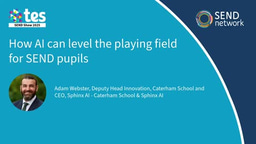Half Year Update – SEND And Mental Health – February 2023

Who’s who in the Department for Education?
There have been numerous changes at the DfE over the last few months but in mid- November the team was finally announced and there have been no changes since then.
- The Right Honorable Gilliam Keegan MP – Secretary of State for Education
- The Right Honorable Nick Gibb MP – Minister of State for Schools
- The Right Honorable Robert Halfon MP – Minister of State for Skills, Apprenticeships and Higher Education
- Claire Coutinho MP – Minister for Children, Families and Wellbeing – Includes SEND
- Baroness Barran MBE – Minister for the School System and Student Finance
Early years foundation stage profile handbook – Updated 10th October
This handbook supports EYFS practitioners in making accurate judgements about each child’s attainment. It has been updated for 2023.
£180 million to improve children’s development in the early years – Press Release – 20th October
Every region in England will benefit from programmes to improve teaching of children’s early speech, language and numeracy, along with professional development to build strong leadership skills and improve the understanding of children’s development.
Early years education recovery programme – 20th October
This guidance contains information on new continuing professional development, qualifications and support and guidance for the early years sector funded by the Department for Education.
The package offers training in:
- child development
- communication and language, early mathematics and personal, social and emotional development through the third phase of our professional development programme
- Nuffield Early Language Intervention
- leadership of settings with a new national professional qualification in early years leadership supporting care givers in their home learning environment
Plus, additional funding for qualifications:
- graduate-level specialist training leading to early years teacher status
- accredited level 3 early years SENCO qualification
- a review of the level 3 qualification and criteria
The Prevent duty: an introduction for those with safeguarding responsibilities – 24th October
This guidance offers support for those working in education settings with safeguarding responsibilities.
Making a referral to Prevent – 24th October
Guidance on how to report any concerns you have about a child, young person or adult learner who you think may be vulnerable to being drawn into extremism.
Prevent duty self-assessment tool for schools – 24th October
This guidance contains a self-assessment tool to help schools in England review their responsibilities under the Prevent duty.
Improving attendance: good practice for schools and multi-academy trusts – Updated 8th November
In this series of case studies, schools and multi-academy trusts (MATs) share their different techniques for improving attendance rates in their settings. The ‘School attendance guidance training webinar – analysing absence and attendance data’ has been added.
In this blog, the SoS Gillian Keegan talks about the future of SEND – the Government has received extensive feedback through the consultation on the SEND Green Paper and a full response and Improvement Plan will be published early in the new year.
In the Autumn Statement there was a commitment to investing £2 billion in extra funding both this year and next, which will mean by 2025, we will be spending more in schools than ever before.
The SoS also confirmed that the DfE are taking forward two additional measures to support children with SEND: investing £21 million into training 400 more educational psychologists, who play a critical role in the educational support available to children with SEND, and extending a training programme to up to 150 more schools for teachers to use assistive technology to better support their pupils.
Serious case reviews: analysis, lessons and challenges (2017 to 2019) – 15th December
This research report analyses serious case reviews (SCRs), with findings for professionals working with children and families. This report is an overview and analysis of 235 cases which led to serious case reviews (SCRs) between April 2017 and September 2019, because children or young people had died or suffered serious harm, and abuse or neglect was known or suspected (and, in the non-fatal cases, there was cause for concern as to the way in which agencies had worked together to safeguard the child).
Pupil premium – Updated 16th December
This information on Information on pupil premium funding, how school leaders can use it effectively and pupil premium strategy statements has been updated with pupil premium rates for the financial year 2023 to 2024.
- Pupils who are eligible for free school meals, or have been eligible in the past 6 years (including eligible children of families with no recourse to public funds) –
Primary – £1,455 Secondary – £1,035
- Pupils who have been adopted from care or have left care plus children looked after
Primary and Secondary – £2,530
- Service pupil premium – £335 per eligible pupil
State of the nation 2022: children and young people’s wellbeing – 7th February
This report outlines the wellbeing of children and young people over the academic year 2021 to 2022.
Mental health issues affecting a pupil’s attendance: guidance for schools – 7th February
This guidance, to be read alongside the Working together to improve school attendance guidance, makes clear the expectations placed on school staff as well as academy trustees/governing bodies, parents/carers and Local Authorities (LAs) where there is a pupil experiencing social, emotional or mental health issues that are affecting attendance. It sets out the ‘reasonable adjustments’ that schools should make to support attendance of this group of students.
CONSULTATION: Use of reasonable force and restrictive practices in schools – 16th February
The DfE are seeking to understand how reasonable force, restraint and restrictive practices are used in schools, to inform revisions to guidance.
This call for evidence will focus on understanding more about the use of reasonable force, physical restraint and restrictive practices in schools.
It will inform revisions to existing guidance to ensure all schools are calm, safe and supportive environments, where staff and pupils can work in safety and are respected.
This consultation closes on 11 May 2023.
Documents from Ofsted
The latest research report from Ofsted – Now the whole school is reading’: supporting struggling readers in secondary school followed research undertaken in six secondary schools with the aim to explore how schools make sure that pupils who leave primary school unable to read age-appropriate books fluently can become proficient readers and keep up with all their other curriculum subjects.
Early education is vital for children born in lockdown – Ofsted Research Report – 14th November
Ofsted has published the first in a series of reviews on early years education. The report stresses the value of play and teaching, and the importance of developing communication skills.
Improving outcomes for children and young people with SEND – Ofsted – 29th November
Ofsted and the Care Quality Commission (CQC) have launched a new joint framework for inspecting provision for children and young people with special educational needs and/or disabilities (SEND) within a local area. Beginning in January 2023, inspections will focus on whether local area partnerships are delivering improved outcomes and experiences for children and young people with SEND.
The new handbook and framework can be found here.
After all local areas have been inspected for SEND, over half (55%) have been required to produce a written statement of action (WSoA), which are required to address significant weaknesses in the local areas’ SEND arrangements.
At a regional level, the proportion of local areas with a WSoA ranges from 33% in London to 82% in the East of England.
By 31 August 2022, 46 local areas with a WSoA have received a revisit. Under half (20) were making sufficient progress in addressing all significant weaknesses identified during their initial inspection. Just over half (24) had made progress in some, but not all, weaknesses. Two had made insufficient progress in addressing any weaknesses.
Ofsted: Schools and early education update: December 2022
In this edition, Ofsted include the following guidance and information:
- clarification of ‘Previous inspection grade’ on a graded report and ‘Date of previous inspection’ on graded and ungraded reports
- review of tutoring in schools
- relationships, sex and health education in schools that have sixth-form students
- clarification of Ofsted’s use of data during inspections
- early education updates
- early years focus in our strategy
- early years research series
- early years curriculum roadshows
- safeguarding updates
- the report of the Independent Inquiry into Child Sexual Abuse
- updated Department for Education (DfE) guidance on searching, screening and confiscation at school
- Child Safeguarding Practice Panel review of domestic abuse
- DfE attendance guidance
- DfE updates on national leaders of governance and the trust and school improvement offer
Subject report series: science – 2nd February
This subject report evaluates the common strengths and weaknesses of science in the schools inspected. The report shares what we’ve learned and builds on the Ofsted science research review which identified factors that contribute to high-quality school science curriculums, assessment, pedagogy and systems.
Art should command an important place in every school – Research Review – 22nd February
Ofsted has published its latest curriculum research review, this time looking at art education in schools.
Documents from the Standards and Testing Agency
The Standards and Testing Agency have published their suite of documents to support KS1 and KS2 SATs next summer.
- 2023 key stage 1: assessment and reporting arrangements (ARA)
- Key stage 1 tests: access arrangements
- Teacher assessment frameworks at the end of key stage 1
- 2023 key stage 2: assessment and reporting arrangements (ARA)
- Key stage 2 tests: access arrangements
- Teacher assessment frameworks at the end of key stage 2
Multiplication tables check – Standards and Testing Agency – 4th November
This information has been updated with dates for 2023.
Primary assessments: future dates – Updated 12th December
Following the announcement of a bank holiday on Monday 8 May 2023 there has been a change of dates for the KS2 SATs in 2023. The new schedule will be:
- Tuesday 9 May: English grammar, punctuation and spelling (GPS) papers 1 (questions) and 2 (spelling)
- Wednesday 10 May: English reading paper
- Thursday 11 May: mathematics papers 1 (arithmetic) and 2 (reasoning)
- Friday 12 May: mathematics paper 3 (reasoning)
Training
New for 2023, nasen is pleased to bring you Twilight Talks.
Hear from specialists across the sector on a range of different topics relating to SEND and additional needs. As well as developing knowledge and awareness of different elements of SEND, there will be points for reflection and practical take aways.
The first one on 9th March is on Supporting Deaf and Hard of Hearing Learners in Education. This is a free session
Nasen and Whole School SEND have produced a series of online Continuing Professional Development (CPD) units is designed to support those who work with children and young people in schools and further education settings to deliver an inclusive experience for every learner.
Free child development training for Early Years practitioners
The government has released the first four modules of the Early Years child development training. This is an online programme designed to help practitioners improve their knowledge and understanding of child development so they can support children in early education settings.
Resources
Childnet – Thrive Online: Helping educators, parents and carers to support young people aged 11 and over with Special Educational Needs and Disabilities (SEND).
These free, adaptable resources cover the important topics of healthy relationships, digital wellbeing and online pornography and are designed to equip and enable educators, parents and carers, to support young people aged 11 and over with Special Educational Needs and Disabilities (SEND).
e-bug – a new health education programme
e-Bug, operated by the UK Health Security Agency, is a health education programme that aims to promote positive behaviour change among children and young people to support infection prevention and control efforts. Health protection guidance and new free e-Bug resources are now available for educators, community leaders, parents, and caregivers to educate children and support childcare settings to prevent and respond to outbreaks.
Free NHS resources to support RSE curriculum
A new set of resources has been co-created with teachers and young people and designed to improve students’ understanding and start the conversation on important topics such as self-care, social media, building connections, dealing with change and more.
Education Endowment Foundation – Evidence for the Early Years
EEF have produced support and resources for professionals working in schools, nurseries and other early years settings. They have also updated their Early Years Toolkit.





Please sign in or register for FREE
If you are a registered user on SEND Network, please sign in